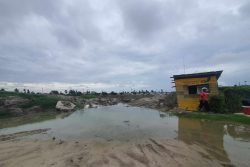The fact that, notwithstanding the persistent ‘nudging’ by this newspaper, we have not heard ‘a peep’ out of the two ‘lead Heads’ nor their designated ‘minder ministers’ holding the respective relevant portfolios, has moved the matter of the regional Food Security Terminal into the realm of puzzlement and beyond that, has given rise to the speculation as to whether, in terms of the execution of what had been touted as a critical assignment for the region, and especially for the more vulnerable countries in the Community, something might not have ‘gone wrong’. This, of course, is mere speculation and while the intention here is not to create a condition of undue alarm, we believe that if what is needed is a measure of aggressive speculation, it is the fault of the Heads and their respective functionaries, that is to say, their respective Ministers of Agricul-ture.
It will be recalled that the decision that the Caribbean undertake an urgent food security mission was triggered by reports from more than one globally recognized food security organizations. At the time of the announcement that the region would embark on a food security mission, some of the smaller member countries of the region had already arrived at a point where their food security circumstances were, reportedly, dire. Truth be told, it can hardly be said that the regional food security undertaking that followed reflected what, in some instances, were the deeply worrying assessments of the circumstances. Here it will be recalled, that in the instances of some of the smaller territories, the situation had arrived at a point where people of lesser means were actually missing meals.
There can be no question than that the food security undertaking was, for some territories, a considerable emergency, and that above everything else, the assignment needed to be undertaken with dispatch. Here, the ‘lead’ Heads and their ‘Lieutenants’ would presumably have been seized with the urgency of the situation so that the various rounds of ‘ritual and ceremony’ could have been ‘cut’ from the programme and the ‘brass tacks’ gotten down to with due haste. Here the point should be that while no one expected that the assignment would have moved from the proverbial ‘scratch’ to a full-fledged Food Security Terminal in an instant, the available evidence then did not suggest that once the exercise had gone beyond the ‘ritual and ceremony’ it would have, incrementally, lost momentum, even at some points appearing to accomplish not a great deal more than providing a healthy measure of region-wide ‘exposure’ for President Ali and Prime Minister Mottley.
There have been other concerns expressed within and without the region since the disclosure of the Food Terminal undertaking, and while one imagines that this would have been one of the more critical assignments of the overall undertaking, particularly for that reason, it would have been supported by a reliable mechanism with which to keep the people of the region informed of what was happening. Indeed, if only. Because the whole idea of a regional Food Security Terminal was derived from what was perceived as a regional crisis, at least insofar as some member countries were concerned, it stood to reason that reliable mechanisms ought to have been put in place to keep the intended beneficiaries of the project briefed.
Here, again, it should be said that several opportunities were missed in the matter of updating the region on the matter of the Food Security Terminal. Here, we recall that long before the most recent meeting of CARICOM Heads, the opportunity of the meeting in Georgetown between Ministers Indar Weir and Zulfikar Mustapha also yielded nothing.
To say that the circumstance is an affront to the people of the Caribbean is to indulge in understatements. The assessment that led to the regional food security undertaking derived from an emergency that had been pinpointed and commented on by more than one highly reputable international organization, possessed of their respective food security agendas, and the fact that those Heads of Government assigned execution of this important task, have not, up to this time, delivered, is, to say the least, ‘bad form.’ The people of the region are entitled to much better treatment from their leaders.






